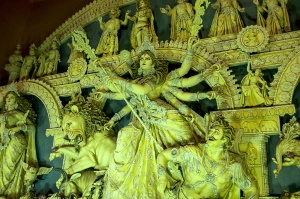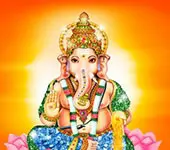Recommended for you
Why Shakti peethas are fifty one in number?
 Click here to know more..
Click here to know more..
Jatayu

Jatayu was old. Ravana was young and heavily armed. Still, Jatayu swung into action when he saw injustice happening.....
Click here to know more..Kalpaka Ganapati Stotram

shreemattilvavane sabheshasadanapratyakkakubgopuraa- dhobhaagasthitachaarusadmavasatirbhaktesht'akalpadrumah' .....
Click here to know more..
English Topics
Devi
Click on any topic to open
- 47 A Man Becomes a Woman and Again a Man
- 46 Prayer To Saraswati Devi
- 45 Background Of Srividya Sadhana
- 44 Do you know what happened when Gowri and Lakshmi deserted their husbands?
- 43 Why Devi Is Called Chandee
- 42 Why Pujas Should Be Done By Husband And Wife Together
- 41 Lakshmi Devi Had Become A Horse Once. Do You Know This Story?
- 40 Atomic theory of Vaisheshika connected to Devi
- 39 Important Messages From Durga Saptashati
- 38 Aditi The Mother Of Devas
Please wait while the audio list loads..
30
Ganapathy
Shiva
Hanuman
Devi
Vishnu Sahasranama
Mahabharatam
Practical Wisdom
Yoga Vasishta
Vedas
Rituals
Rare Topics
Devi Mahatmyam
Glory of Venkatesha
Shani Mahatmya
Story of Sri Yantra
Rudram Explained
Atharva Sheersha
Sri Suktam
Kathopanishad
Ramayana
Mystique
Mantra Shastra
Bharat Matha
Bhagavatam
Astrology
Temples
Spiritual books
Purana Stories
Festivals
Sages and Saints
26
15
13
Copyright © 2024 | Vedadhara | All Rights Reserved. | Designed & Developed by Claps and Whistles
